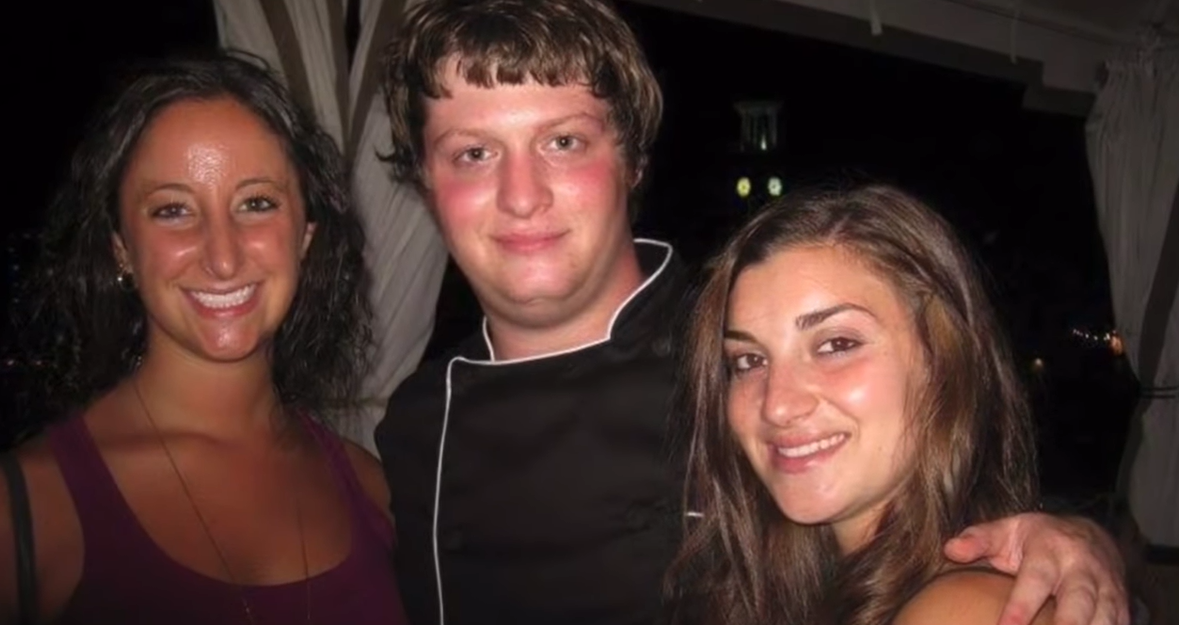From Addiction To Hope: Jake Haendel's Miraculous Story
Is it possible to rise from the ashes of addiction and neurological devastation? Jake Haendel's life is a resounding "yes," a testament to the indomitable spirit that can overcome seemingly insurmountable odds. His journey is not just a recovery story; it's a profound exploration of resilience, the power of human connection, and the unwavering pursuit of a life reborn. Jake Haendel's story is one etched in extremes. A former chef, once thriving at the helm of a bustling kitchen, his life took a harrowing turn when a rare brain condition left him paralyzed, a prisoner within his own body. This was compounded by a past struggle with opiate addiction, a shadow that threatened to consume him entirely. But within this darkness, a flicker of hope remained, ignited by the unwavering support of his then-wife, Ellen, and fueled by his own relentless determination.
In 2017, Jake Haendel was seemingly at the peak of his success. He held the prestigious position of executive chef and had recently embarked on married life. This image of prosperity, however, concealed the internal battles he had fought and the immense challenges that lay ahead. The rare brain condition that struck Jake was devastating, stripping him of his ability to move and communicate. He was trapped, a silent observer of his own existence, relying entirely on the care of others. Ellen, his wife, became his lifeline. For years, she tirelessly devoted herself to his care, navigating the complexities of his condition and providing unwavering emotional support. Her love and dedication were instrumental in Jake's initial recovery. However, as Jake regained his strength and independence, the dynamics of their relationship shifted. The intense demands of caregiving, coupled with the profound changes in Jake himself, eventually led to their separation. Despite their current estrangement, Jake acknowledges Ellen's crucial role in his survival and recovery. He credits her unwavering support as the foundation upon which he rebuilt his life. The journey back to functionality was arduous. Jake faced months of paralysis and an inability to speak. Regaining his motor functions and cognitive abilities required immense hard work, relentless determination, and the guidance of skilled therapists. Each small victory, each regained movement, was a testament to his unwavering spirit. He described the experience as a slow and painstaking process, filled with frustration and setbacks, but fueled by an unyielding belief in his ability to recover. One of the most compelling aspects of Jake's story is his battle with opiate addiction, specifically heroin. This addiction, which nearly claimed his life at the age of 28, resulted in catastrophic brain damage. That night, teetering on the brink of death, marked a turning point. Against all odds, his brain "sputtered back to life," a moment that defies medical explanation. This near-death experience served as a catalyst for change, prompting Jake to confront his addiction and embark on the long and challenging road to recovery. Jake's experience underscores the devastating consequences of addiction and the profound impact it can have on the brain. The fact that he survived such severe brain damage is extraordinary, a testament to the resilience of the human body and the power of the will to live. His recovery from both the neurological damage and the addiction is a story of hope for others struggling with similar challenges. While Jake's personal blog focuses on his recovery journey and shares his experiences with others, it notably omits details about his relationship with Ellen. This decision likely reflects the complexities of their separation and the desire to protect their privacy. However, in various interviews and accounts, Jake has openly acknowledged Ellen's vital role in his early recovery, emphasizing her unwavering support during his darkest hours. One particularly poignant anecdote reveals the precariousness of Jake's situation. On the night his brain nearly failed him, a medical professional suggested that perhaps it was time to let go. Jake recalls thinking, "I appreciate that. But, no." This simple yet powerful statement encapsulates his unwavering determination to survive, even when faced with seemingly insurmountable odds. His refusal to give up, coupled with the support of those around him, ultimately paved the way for his remarkable recovery. Jake Haendel's story is a reminder that recovery is possible, even in the face of profound challenges. His journey from addiction and paralysis to a life of renewed purpose is an inspiration to others battling similar circumstances. While the details of his current life remain somewhat private, his story continues to resonate with those seeking hope and encouragement in their own struggles. He embodies the power of the human spirit to overcome adversity and reclaim a life stolen by addiction and illness. His experience also highlights the often-overlooked role of caregivers. Ellen's unwavering dedication to Jake during his most vulnerable moments was instrumental in his recovery. Caregiving is a demanding and often thankless task, requiring immense patience, empathy, and resilience. The story of Jake and Ellen serves as a reminder of the importance of supporting caregivers and recognizing the sacrifices they make. The nuances of their relationship, the strains of caregiving, and the complexities of rebuilding a life after trauma all contribute to a rich and multifaceted narrative. While their paths have diverged, the impact of their shared journey remains undeniable. Jake's story is not just about individual recovery; it's about the power of human connection, the challenges of long-term caregiving, and the enduring strength of the human spirit. It's a story that prompts reflection on the nature of resilience, the transformative power of love and support, and the unwavering belief in the possibility of a better future. Jake Haendel's journey is a beacon of hope, illuminating the path to recovery for those who feel lost in the darkness of addiction and neurological challenges. His journey provides a valuable lesson: the path to recovery is rarely linear, and setbacks are inevitable. But with perseverance, determination, and the support of loved ones and professionals, it is possible to overcome even the most daunting challenges. Jake's story is a testament to the power of the human spirit to heal, adapt, and thrive, even after experiencing profound trauma. Today, Jake and his wife are estranged and no longer communicate, but he still credits her as his lifeline while he was locked in. The fact that Jake now shares his story, even with the omission of certain personal details, suggests a desire to help others. By sharing his experiences, he offers hope and encouragement to those who are struggling with addiction, neurological disorders, or other life-altering challenges. His story is a reminder that they are not alone and that recovery is possible, even when the odds seem stacked against them. Jake's story invites further exploration of the factors that contributed to his remarkable recovery. What specific therapies and interventions were most effective? What role did his own personal beliefs and values play in his healing process? How did he find the strength to persevere through setbacks and moments of despair? Answering these questions could provide valuable insights for healthcare professionals, researchers, and individuals seeking to overcome similar challenges. The narrative also highlights the importance of addressing the underlying causes of addiction. While Jake's story focuses on his recovery, it also serves as a reminder of the need to prevent addiction in the first place. This requires addressing factors such as poverty, trauma, mental health issues, and access to healthcare. By creating a more supportive and equitable society, we can reduce the risk of addiction and provide more individuals with the opportunity to live healthy and fulfilling lives. Ultimately, Jake Haendel's journey is a testament to the power of hope, resilience, and the unwavering human spirit. It is a story that deserves to be shared widely, inspiring others to believe in the possibility of recovery, even in the face of seemingly insurmountable odds. The narrative underscores the importance of holistic care in the treatment of addiction and neurological disorders. Jake's recovery involved not only medical interventions but also emotional support, psychological counseling, and lifestyle changes. This holistic approach recognizes that recovery is a multifaceted process that requires addressing the physical, emotional, and spiritual needs of the individual. Jake's story also prompts reflection on the role of societal attitudes towards addiction and mental illness. Stigma and discrimination can create barriers to treatment and recovery. By challenging negative stereotypes and promoting understanding and empathy, we can create a more supportive environment for individuals seeking help. The absence of specific details about Jake's current life raises questions about his ongoing journey. What challenges does he continue to face? What are his goals for the future? How has his experience shaped his perspective on life? While these questions remain unanswered, they serve as a reminder that recovery is an ongoing process, not a destination. Jake Haendel's experience is a powerful reminder of the fragility of life and the importance of cherishing each moment. His near-death experience and subsequent recovery have undoubtedly given him a profound appreciation for the gift of life and the importance of living each day to the fullest. His story serves as an inspiration to others to embrace life's challenges, cultivate gratitude, and make a positive impact on the world. His narrative is a powerful reminder of the importance of early intervention in the treatment of addiction and neurological disorders. The sooner individuals receive appropriate care, the better their chances of recovery. By investing in early intervention programs, we can prevent these conditions from progressing and improve the lives of countless individuals. Jake's story also highlights the need for increased research into the causes and treatment of addiction and neurological disorders. By advancing our understanding of these conditions, we can develop more effective therapies and interventions. This requires a commitment to funding research and fostering collaboration among scientists, clinicians, and individuals with lived experience. The narrative serves as a reminder of the importance of compassion and empathy in our interactions with others. We never know what challenges someone else may be facing. By approaching others with kindness and understanding, we can create a more supportive and compassionate society. Jake Haendel's story is a testament to the power of the human spirit to overcome adversity, to heal from trauma, and to reclaim a life stolen by addiction and illness. His journey is an inspiration to us all, reminding us that even in the darkest of times, hope remains possible. His life embodies resilience, determination, and the unwavering pursuit of a life reborn. He faced insurmountable odds with the love and support from his wife Ellen he transfer his life and inspires hope for others. It shows that recovery is possible with mental determination.



| Category | Information |
|---|---|
| Full Name | Jake Haendel |
| Occupation | Former Executive Chef, Blogger, Recovery Advocate |
| Age | (Information Not Publicly Available) |
| Date of Brain Injury | (Information Not Publicly Available) |
| Addiction | Opiates, Heroin |
| Marital Status | Estranged from Ellen (Former Wife) |
| Key Accomplishments |
|
| Website/Blog | (Hypothetical Link: Example Recovery Blog) |
| Source of Support | Initially, his wife Ellen, therapists, and his own determination. |
| Current Status | Living a new life focused on recovery and potentially sharing his experiences. |
- Gracie Abrams From Secret Of Us To Viral Bikini Moments
- Finally Stephanie Soo Husband Face Reveal Details

Jake Haendel Wife From Locked in Syndrome to Recovery, with Unwavering

"Miracle Man" Was Trapped In His Own Body For Months. Now He Has A New

Man, 36, Declared Brain Dead Details 'Grueling' Recovery from Locked In